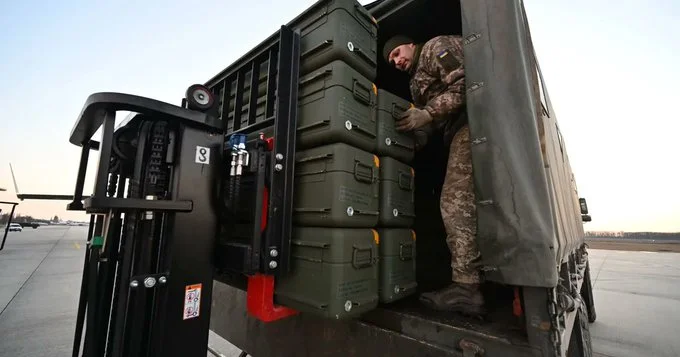

After being stunned by the rapid Russian advance , Europe with France and Germany in the lead, appears to have decided to arm Kiev in the hope of triggering a resistance and stopping a sudden collapse of the Zelenskyy government.
<p>
After being&nbsp; stunned by the rapid Russian advance , Europe with France and Germany in the lead, appears to&nbsp; have decided to arm Kiev in the hope of triggering a resistance and stopping a sudden collapse of the&nbsp; Zelenskyy&nbsp; government.</p>
<p>
Both countries of course are not putting boots on the ground. Instead, one of them is&nbsp; despatching anti-tank missiles that can help retard, if not deter the advance of Russian armour. Second, the Europeans are arming the Ukrainians with the Stinger shoulder fired missiles which are suitable for downing Russian helicopter gunships.</p>
<p>
The idea is similar to what happened in Afghanistan in 1979 when Soviet troops crossed the Hairatan bridge over the Amu Darya and advanced to Kabul. The CIA with the support from its allies especially Saudi Arabia and Pakistan supplied game-changing Stinger missiles to down Russian helicopter gunships. The weapons proved decisive in dramatically denuding Soviet air power, allowing the well-armed western backed Mujahideen to defeat a superpower.</p>
<p>
Now with Europe in the frontline, French President Emmanuel Macron has decided &quot;to organize additional supplies of military equipment to the Ukrainian authorities, and to provide fuel assistance,&quot; the French security and national defence council said in a statement on Saturday evening after a high-level meeting.</p>
<p>
Late on Saturday, Germany announced that it would deliver 1,000 antitank weapons and 500 Stinger missiles to the Ukrainian armed forces.&nbsp; Germany also green lighted supply of old German-made missiles by the Netherlands and Estonia to Ukraine, reversing its earlier decision to do so.</p>
<p>
<strong>Video:&nbsp;</strong></p>
<blockquote class="twitter-tweet">
<p dir="ltr" lang="en">
Germany &#127465;&#127466; delivers Stinger missiles to Ukraine. This video might be helpful. <a href="https://twitter.com/hashtag/Ukraine?src=hash&amp;ref_src=twsrc%5Etfw">#Ukraine</a> <a href="https://twitter.com/9b3OR2qdITMbDcd?ref_src=twsrc%5Etfw">@9b3OR2qdITMbDcd</a> <a href="https://twitter.com/jesusfroman?ref_src=twsrc%5Etfw">@jesusfroman</a> 1/2 <a href="https://t.co/uQLDvb70mN">pic.twitter.com/uQLDvb70mN</a></p>
&mdash; Felix Woessner (@FeWoessner) <a href="https://twitter.com/FeWoessner/status/1497647346900946945?ref_src=twsrc%5Etfw">February 26, 2022</a></blockquote>
<script async src="https://platform.twitter.com/widgets.js" charset="utf-8"></script><p>
The calibrated shift in French and German stance raises several key questions. Have&nbsp; the two European Union heavyweights, France and Germany,&nbsp; decided to play a leading role in mounting resistance to Russian intervention in Ukraine, to compensate for the embarrassingly sluggish response from the Biden administration, already embarrassed by the Afghan debacle,&nbsp; in the United States? After holding a regular dialogue with Russian President Vladimir Putin, has Macron decided to give a pause to his&nbsp; diplomatic activism to defuse the crisis?&nbsp; Has the new post-Merkel leadership in Germany decided to play a more muscular role in Europe&mdash;something that would be unprecedented in the post-war era, risking triggering faint historical memories of another era?</p>
<p>
The European riposte also includes releasing strong economic disincentives to Russia&mdash; despite the fact that these moves may not necessarily work, given Moscow&rsquo;s &ldquo;comprehensive national power&rdquo; based on its strong agricultural and industrial capacity, which can be absorbed by its domestic market. It is also unlikely that Russian weapon and energy exports&mdash;the pillars of Moscow&rsquo;s economy– will be hit by sanctions.</p>
<p>
Nevertheless, the French President &quot;made a decision to toughen economic and financial sanctions in coordination with European countries and the United States.&quot;</p>
<p>
Besides, Macron said he is determined to take &quot;measures to freeze financial assets&quot; of Russian public figures on the national level.</p>
<p>
Other headline economic pain-points include a statement by the Society for Worldwide Interbank Financial Telecommunication (SWIFT) that it was preparing to comply with orders from Western powers to de-link Russia from its system.</p>
<p>
SWIFT said in a statement to Reuters that&nbsp; it was &ldquo;engaging with European authorities to understand the details of the entities that will be subject to the new measures&rdquo; and was &ldquo;preparing to comply upon legal instruction.&rdquo;</p>
<p>
The European Commission, France, Germany, Italy, the United Kingdom, Canada, and the United States also announced on&nbsp; Saturday that &ldquo;selected Russian banks&rdquo; would be &ldquo;removed from the SWIFT messaging system&rdquo; in response to the Russian offensive in Ukraine.</p>
<p>
These&nbsp; Western nations also announced that the Russian Central Bank would also not be allowed to deploy &ldquo;its international reserves in ways that undermine the impact&rdquo; of their sanctions.</p>
<p>
<strong>Also Read:&nbsp;</strong> <a href="http:// https://www.indianarrative.com/opinion-news/why-ukraine-crisis-exposes-limits-of-western-power-153314.html">Why Ukraine crisis exposes limits of Western power</a></p>
The India-UK Comprehensive Economic Trade Agreement (CETA) presents unprecedented opportunities for Indian businesses to expand…
External Affairs Minister Dr S Jaishankar spoke to the newly appointed Foreign Minister of South…
The Indian Space Research Organisation (ISRO) is gearing up for a series of exciting missions.…
The India UN Fund has completed the construction of the historic Niangdo dam in Burkina…
The Taiwan Economic and Cultural Representative Office in Japan has strongly condemned political interference during…
Gati Shakti Vishwavidyalaya in Vadodara, which has been largely focused on logistics in the railway,…